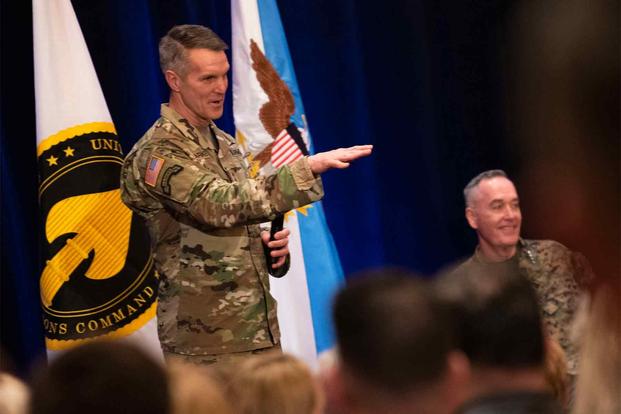The end of the war in Afghanistan will spark a new era of opportunities for U.S. Special Operations Command, or SOCOM, to prepare for the future, Army Gen. Richard Clarke said Tuesday.
During his keynote address at the virtual 2021 Special Operations Forces Industry Conference, Clarke, the commanding general of SOCOM, said that the command must adjust to changing threats now that the nation's longest war is coming to a close.
"SOCOM were the first forces [into Afghanistan nearly 20 years ago], and we'll be the last forces out," he said. "I don't necessarily see this as the end of an era but, instead, as part of a new one that is full of opportunities for all of us."
Read Next: Free Health Care for All Troops Is Key Priority, National Guard General Tells Congress
Clarke reminisced about his own first deployment to Afghanistan in 2002, as part of the 82nd Airborne Division. He noted that special operations is now "hardly recognizable" as the force it was at the beginning of the war, partly due to technological advances.
"The necessity in the wars in Afghanistan, and the war in Iraq and Syria, has been the mother of all invention," he said. "We had urgent needs then, and we'll have urgent needs in the future."
Threats are continuing to evolve, including Russian disinformation campaigns, Chinese activities across the globe, and cyberwarfare such as the Colonial Pipeline hack, which snarled fuel distribution across the U.S. for days.
SOCOM must modernize to meet these threats, Clarke said.
Its four main missions will continue to be crisis response, counterterrorism, competition and -- when necessary -- conflict to support joint forces and allow them to win, he added.
Clarke described competition as "winning without fighting," or taking actions below the level of outright conflict. It will not be bound to a fixed time period where one side wins and the other side loses, he added.
"In the future of competition, there won't be a victory parade," Clarke said. "Instead, our competition will endure and, sometimes, it may be infinite. And because there's no precise end, there's not necessarily a winner. Just nations seeking competitive advantage, and that advantage can ebb and flow."
This kind of competition is not new, Clarke said, but advanced tools and technology have given adversaries new ways to compete against the United States, including in cyberspace and the "information space." Fighting disinformation will affect all forces in all missions, he said.
"Info space will continue to grow," Clarke explained. "It is a battle in the cognitive space. It takes place on the internet, but not always. This is purely distinct from cyber, from the ones and the zeros in the pipeline attack. But it is in the cognitive space that we must prevail."
Some of SOCOM's most challenging achievements in the last decade, such as the operation that killed Osama bin Laden, may end up looking easy compared to the challenges it will face in the future, Clarke said.
The 2019 raid to kill Islamic State founder Abu Bakr al-Baghdadi in northwest Syria, on the other hand, was a much more complicated operation, he said. The forces executing that mission had to dodge near-peer air defenses, proxy armies and cyber threats, he explained.
"That's the type of future of contested [warfare], and that was a small microcosm of what was happening, and what would happen in the future," Clarke said. "So the threats have evolved significantly in the years in between [the bin Laden and al-Baghadi] operations."
Adversaries' drone capabilities are also going to continue to improve, he said, as will their electronic, cyber and information warfare capabilities.
"A sophisticated adversary has a wealth of capabilities to jam, intercept or detect us," Clarke said. "All of [SOCOM's] tools, none of them matter if we can't get from point A to point B. So how do we move our SOF personnel while maintaining the element of surprise, particularly when an adversary is looking?"
Clarke said SOCOM also must figure out how to "push our data to the tactical edge, giving our operators the same advantage to make decisions even in a fight."
SOCOM will have to innovate to meet future threats, by investing in both its people and new crucial technologies, he said.
As part of that effort, more than 300 mid- and senior-grade SOCOM leaders are wrapping up a six-week virtual course on artificial intelligence with the Massachusetts Institute of Technology, he said.
-- Stephen Losey can be reached at stephen.losey@military.com. Follow him on Twitter @StephenLosey.
Related: Aircraft Competing to Be the New SpecOps 'Armed Overwatch' Plane Now Face a Tough Series of Tests












